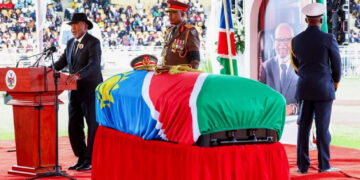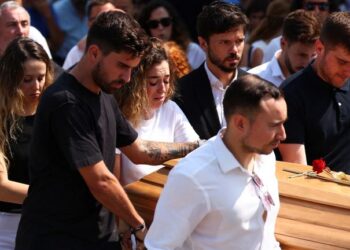By Enyichukwu Enemanna
The recent death of Nigerian actor, Pope Odonwodo, popularly known as Junior Pope, along with three others, following a boat mishap while returning from a movie set in Asaba, Delta State, has indeed stolen the peace of the country’s film industry, leaving his fans and entertainment enthusiasts shattered and broken.
Report has it that the actor was working on a movie titled, ‘The Other Side of Life’, produced by one Adanma Luke, which required the cast and crew to cross the River Niger in order to get to the set.
While embarking on the journey, the actor had in a video pleaded with the boat driver to exercise caution, that he was an only child (of his parents), and that he had three young children to raise. He further emphasized to his fans that actors often take huge risks in order to entertain them.
It however turned out that this was the last movie Junior Pope will be involved in, as he and three other members of the crew lost their lives when the boat capsized on April 10, 2024.
Many were however left in confusion when the actor was brought out of the water and taken to the morgue, instead of the hospital for further examinations on him. That was not done. He was also not taken through cardiopulmonary resuscitation (CPR) immediately he was brought out. A source privy to the incident told Heritage Times HT that Junior Pope was later ferried to the water side on the instruction of a certain spiritualist for rituals to bring him back to life, which of course ended without any result.
This again highlights the obvious lack of workable emergency response mechanism and poor awareness among Nigerians on first line of action when similar incidents occur. Many persons also depend on certain spiritual powers as against opting for medication for their illness. It was a lost opportunity at “golden moment,” a moment that could be the only chance to prevent secondary injuries, and give the victim opportunity to live.
It has become a recurrent decimal to see supposed first responders in accident scenes scramble to take pictures of victims, dehumanizing and making show of them rather than offering the needed shoulder of assistance that could help them live. Others are also out to loot and make away with victims’ belongings in a crude and inhuman manner. Little wonder pictures of the incident flooded the social media with the speed of light, yet no scene indicated where a revival effort was being carried out on any of the victims.
Even in cases of fire, flooding, disease outbreak or other natural occurrences which are often recorded in most parts of the country, some “first responders” care less about the dignity of human life which we all sign up to, but scavenge whatever will give them social media millage. This was why everyone was scrambling to “break” the news of the disaster that took the actor’s life and that of others.
Blame It On Poor Emergency Response Skills — Expert
A medical expert however said awareness on adequate response to emergency cases is low in the country. Dr. Faith Ekpekurede, Doctor of Emergency Medicine and Ambulance Services of Reddington Hospital Group in an interview monitored by Heritage Times HT, said several people are at a loss and do not know what to do during emergencies as a result of lack of knowledge.
She emphasized that a public-private sector approach, which will help to educate the populace to identify the nature of emergencies and the needed response has become very important at this moment. This she said would reduce fatalities during emergency situations and such a huge task of awareness creation cannot be shouldered by the government alone.
In the case of Junior Pope, she said, “In a place where things are working, the first thing you will have to do is, assess the patient and see if he is responsive, if he is not responsive, call for help.
“You tap and shout hello, if you know the name of the person, you call him, if you don’t, hit him on the shoulders, lying face up and shout, hello can you hear me, and if he doesn’t say anything, call for help. In this case, you place call on emergency numbers,” she advised.
She further commended the Federal Ministry of Health for the recent introduction of emergency toll-free number 112, a development she said is a step forward. “Before they arrive, people on ground will have to do something and that is where training comes in. Most people don’t know what to do, if the victim doesn’t respond, you do a cardiopulmonary resuscitation (CPR).” Dr. Ekpekurede insists that a private sector-driven approach that will sensitize the public on how to administer CPR, both for health care and non-health care providers is the way to go.
Describing what CPR entails, she said it is a situation that involves pressing the victim’s chest, and blowing air into his/her mouth. She however highlighted that it requires a skill, urging that everyone should acquire it in case emergencies arise. She also expressed concern that even when some persons know what to do, they are scared of doing it for fear of being victimized by security agencies in cases of eventuality.
Reps Resolution on ‘First Responder’ Services: How Far So Far?
In 2023, Nigeria’s House of Representatives had in a resolution urged the Federal Government to train and deploy first responders to all major highways in Nigeria to help stabilise victims of road accidents before handing them over to the nearest healthcare institutions for further attention.
This was in adoption of a motion sponsored by Hon. Olamijuwonlo Alao-Akala from Oyo State. Alao-Akala had explained that a first responder is a person with specialised training, who is amongst the first to arrive and provide assistance, pre-hospital care or incident resolution at the scene of an emergency to victims of an accident until they are handed over or delivered to a hospital.
He noted that first responders typically include law enforcement officers, in the instant case, commonly known as Federal Road Safety Corps, Nigeria Police Force, paramedics, firefighters, and emergency medical technicians. The lawmaker argued that: “In some jurisdictions, such as the United States of America emergency department personnel, such as doctors and nurses, are also required to respond to disasters and critical situations, designating them first responders.
“One of the primary responsibilities of the Federal Road Safety Commission (FRSC) is to make sure that Nigerian highways are safe for motorists and other road users.
“Section 8(c) of the Federal Roads Maintenance Agency (FERMA) Act gives FERMA the responsibility of planning and managing the development and implementation of road safety standards.”
He expressed concern that innocent lives and dreams have been cut short on Nigeria highways, mostly as a result of the absence of or slow medical response to road accident victims.
Adopting the motion, the House urged FEMA in conjunction with the Ministry of Health and other relevant Ministries to provide fully equipped medical ambulances at every 15km point on every major highway, and every 35km point on all minor highways in the country.
Nine months after this resolution, major highways in the country still visibly lack presence of emergency responders. They are mostly not seen near accident scenes and where they are available, they lack the necessary equipment to offer adequate response that could stabilize accident victims.
Talking about Junior Pope, closeness of first responders probably would have changed the story and he likely may have been alive today. It again calls to question, how much of seriousness is attached to resolutions of the parliament, with regards to providing excellent service to the masses.
Laxity Of Health Workers, Reason For Worry — Analyst
A public affairs analyst, Dr. Chima Obiekwe in interaction with Heritage Times accused some medical workers of lackluster attitude during emergency situations. He expressed dissatisfaction that despite the clarity of Section 33 of the Constitution of Nigeria 1999 (as amended) which guarantees the right to life to every citizen, which also extends to right to access emergency medical care, health workers intentionally undermine the letters of the constitution.
Quoting Section 20 (1) and (2) of the National Health Act, he said a health care provider, health worker or health establishment shall not refuse a person emergency medical treatment for any reason.
He added that a person who contravenes this section commits an offence and is liable on conviction to a fine of N100,000.00 or to imprisonment for a period not exceeding six months or both.
According to him, rejection of accident victims for lack of deposit or police report is unconstitutional and is punishable.
“In the country today, you still find a situation where hospitals and health care workers reject emergency victims for very flimsy excuses. Several emergency victims have lost their lives because hospitals insist on initial deposit before offering treatment. In the case of gunshot, some of them still demand for police report despite abolition of this law since 2017 by the National Assembly.
“We live in a society where premium is placed on money far above human live. Those around Junior Pope would probably have been able to cough out initial deposit if it became an issue, what about those who can’t afford it,” he stated.



































